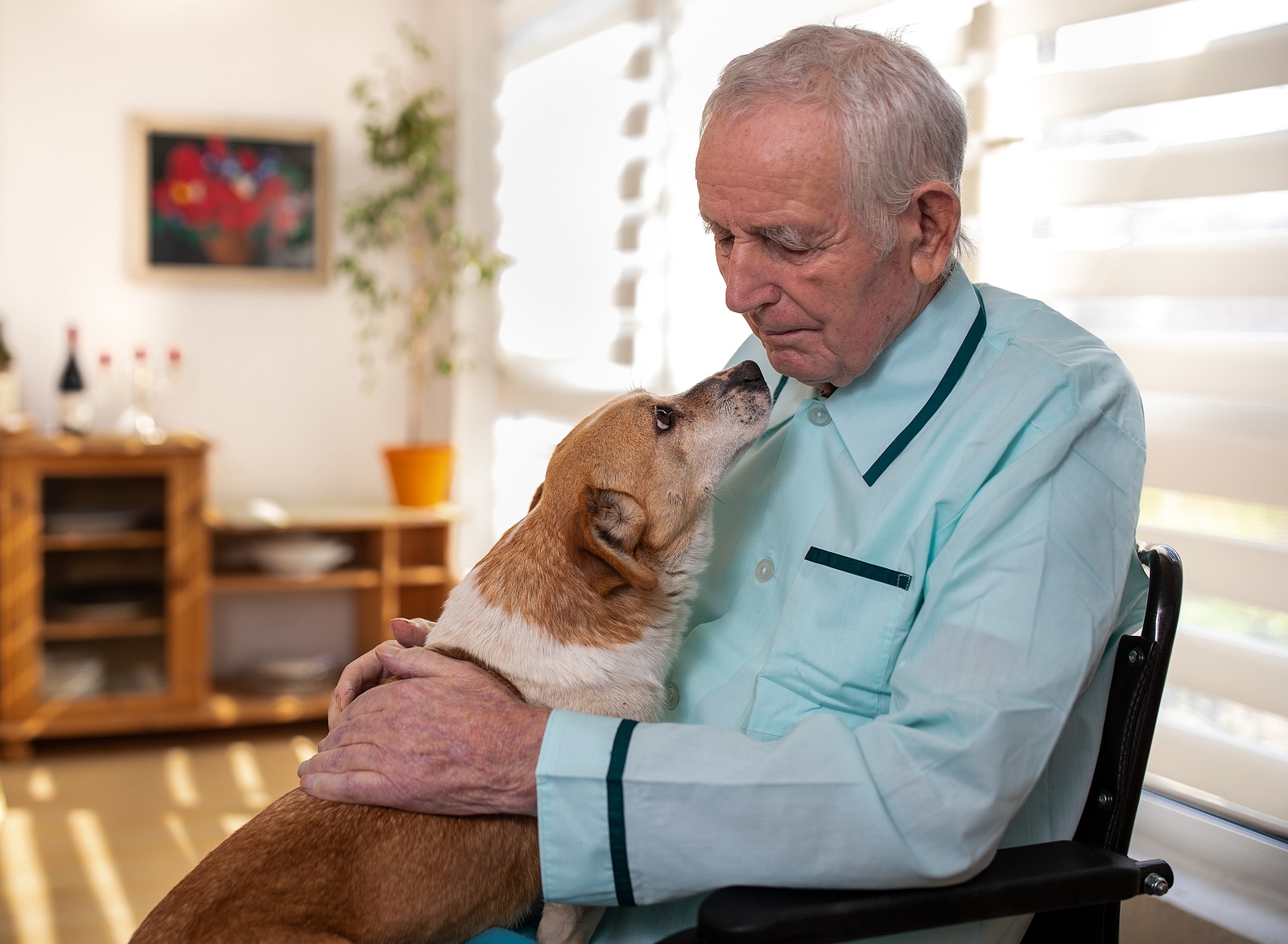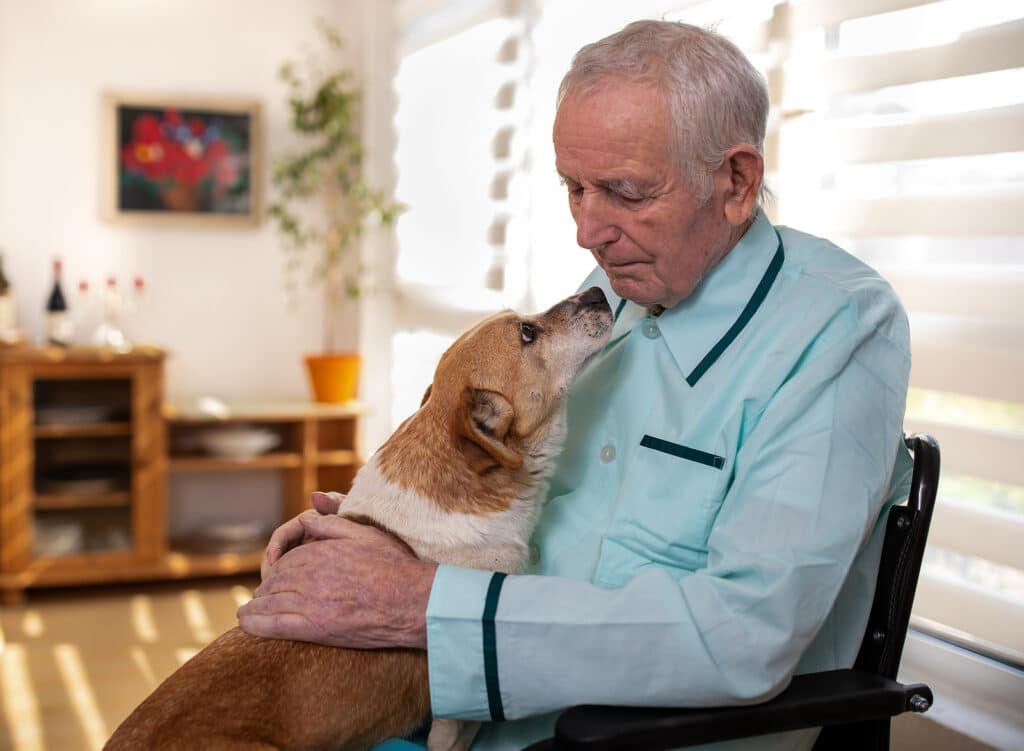
Pets are wonderful companions for seniors. Seniors who have pets are generally happier and healthier than seniors who don’t have pets. Pets provide love and companionship that can help seniors stay physically and mentally healthy. Seniors that are living independently can greatly benefit from having a loving cat or dog in their home.
But, seniors need to make sure that their furry companions are getting regular vet care. And seniors and their home care assistance providers should know the symptoms of illness in pets. Pets are often very good at hiding their illnesses, especially cats. So it’s important for seniors and their home care assistance providers to recognize these signs of illness in pets and get the pet vet care if they see any of these signs:
Change in Appetite
One of the most noticeable signs of illness in pets is a change in their eating habits. If your pet suddenly starts eating significantly more or less than usual, it may indicate an underlying issue.
Weight Loss or Gain
Rapid or unexplained weight loss or gain can be a sign of various health problems, from metabolic issues to digestive disorders. Pet diabetes is on the rise in the United States and the most common first sign of pet diabetes is rapid weight loss or gain. Any time there is a significant change in a pet’s weight they should see a vet.
Lethargy
If your typically active pet becomes lethargic, lacking energy, and unwilling to engage in play or exercise, it may be a sign of illness. Cats particularly tend to hide if they are sick, so if your cat is hiding in a closet or under the bed and they don’t usually do that they could be sick.
Vomiting and Diarrhea
Occasional upset stomachs are normal, but persistent or severe vomiting and diarrhea can be indicative of gastrointestinal issues, infections, or dietary problems. If your pet vomits just once it could be a run of the mill issue, such as ingesting a bug, but if they vomit violently or multiple times they should see a vet.
Changes in Urination
Frequent urination, difficulty urinating, or blood in the urine can be signs of urinary tract infections, kidney problems, or diabetes. Cats who urinate outside the litter box should see a vet right away to rule out a medical problem.
Coughing and Sneezing
Persistent coughing, sneezing, or difficulty breathing may be symptoms of respiratory infections, allergies, or heart conditions.
Excessive Thirst
Increased water consumption (polydipsia) can signal diabetes, kidney disease, or other underlying conditions.
Behavioral Changes
Unusual behaviors such as aggression, anxiety, hiding, or excessive vocalization can be signs of physical discomfort or emotional distress.
Bad Breath
Foul-smelling breath can be a sign of dental disease or other oral health issues. If your pet seems to not want to eat that can be caused by dental pain or a broken tooth.
Limping or Difficulty Moving
Reluctance to put weight on a limb, limping, or stiffness can indicate joint problems, injuries, or arthritis.
Skin and Coat Changes
Dry, itchy skin, hair loss, rashes, or lumps and bumps on the skin may be indicative of allergies, parasites, or skin infections.
Eye or Nose Discharge
Excessive discharge from the eyes or nose may be a sign of infections, allergies, or respiratory issues.
Change in Grooming Habits
A pet that stops grooming itself or, conversely, grooms excessively may be experiencing discomfort.
Odor Changes
A change in your pet’s natural body odor can be an early indicator of health problems.
Excessive Drooling
While some drooling is normal, excessive drooling can be a sign of dental issues or nausea.
Change in Stool
Abnormal stool, such as diarrhea with blood, mucus, or a change in color and consistency, can be indicative of gastrointestinal problems.
Excessive Scratching or Biting
Constant scratching, biting, or licking can signal skin irritation, allergies, or parasites like fleas or ticks.
Restlessness
Persistent pacing, inability to settle, or frequent changes in position may be a sign of discomfort or pain.
Reference
https://www.americanhumane.org/fact-sheet/recognizing-caring-for-a-sick-pet/
The staff at Home Care Matters is available to talk with you and your family about all of your needs. Home Care Matters is a home care agency providing quality and affordable home care assistance in Johns Creek, GA, and the surrounding areas. Call (770) 965-4004 for more information.
We provide elder care in Braselton, Buford, Dacula, Duluth, Flowery Branch, Gainesville, Johns Creek, Lawrenceville, Oakwood, Sugar Hill, Suwanee, Barrow County, Forsyth County, Gwinnett County, Hall County, Jackson County, North Fulton County.
.
Valerie has the unique experience with home care as she has experienced it from both ends of the spectrum, as a caregiver and as needing care herself as a cancer survivor. Valerie says, “Taking care of someone you love is a physically, mentally and demanding labor of love.Taking care of my mom was the hardest thing I have ever done. It has given me an insight and perspective not many people understand unless you are doing it or have done it.I loved taking care of my mom.I love helping others take care of their love ones too.And now that I’ve been sick, it’s given me a whole new level of empathy and understanding for those who are sick and need help.”
Valerie’s schedule varies daily, but she loves visiting with our clients, families, caregivers, our network partners and being in the office.Says Valerie, “Every day is different, but I wake up excited about what we do, inspired by our team, clients and caregivers.I strive to be a resource to the community.I love my team and I love what we do every day. I like to think my mom would be proud.”
You can reach Valerie by email (Valerie@homecarematters.com) or in our office (770.965.4004).
- How In-Home Alzheimer’s Care Helps Your Parent Stay Safe and Comfortable - December 26, 2025
- After the Fall: How Home Care Helps Seniors Recover Safely at Home - December 19, 2025
- Supporting Seniors with Memory Challenges Through Compassionate Senior Home Care - December 12, 2025

